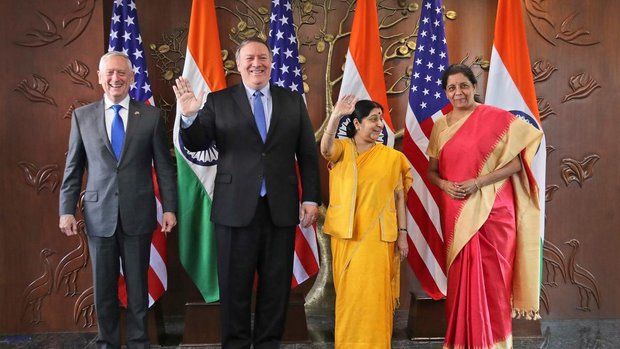The high-profile US delegation was led by Secretary of State Mike Pompeo and Defense Secretary James Mattis, who flew to New Delhi from Islamabad where they held deliberations with the newly-elected government led by Imran Khan on Wednesday.
The highlight of the meeting was signing of the Communications Compatibility and Security Agreement (COMCASA) that will enable India to access advanced technologies from the US and enhance India's defense preparedness. While Pompeo termed the agreement a "milestone" in Indo-US relationship, India’s defense minister Nirmala Sitharaman said it will bolster India's defense capability.
What they didn’t mention is how detrimental it could be for the regional peace and stability, but that is stating the obvious.
The two sides also pledged to expand their bilateral trade and economic partnership, which is interesting. In recent months, India and the US have been engaged in tariff war, with Trump administration refusing any special treatment to New Delhi and Modi government retaliating with its own tariff on US goods.
The new trade deal is a shrewd move by the US to assure New Delhi that they can still do business with each other but on the terms and conditions dictated by the former.
The task for the visiting delegation was cut out - to appease New Delhi with lucrative defense and trade deals so that it does not go the China way. China and India are two of the fastest growing economies and protagonists of new economic and international policy. The policy wonks in Washington understand the importance of keeping India in good humor at a time when the trade war with China is escalating and relations with European countries are fast deteriorating.
Trump administration has declared a trade war against China, threatening to impose $200 billion new tariffs, which experts believe can jeopardize the global economic growth. It has also been embroiled in an ugly tariff war with European countries. At this juncture, with the US finding itself increasingly cornered, it has reached out to Narendra Modi led government in New Delhi.
The US government has been pushing countries to stop oil imports from Iran after unilaterally withdrawing from the 2015 nuclear deal between Iran and six world powers. India has also felt the heat although Modi government has not taken any final decision yet. India is the second largest buyer of Iranian crude oil after China and the U.S. is seeking to influence its energy-import policy, urging it to switch imports from Iran to Saudi Arabia and other U.S. allies. But, can India afford to do that? Certainly not, believe experts.
Iran is extremely critical to India’s energy security and larger geopolitical interests. Moving away from Iran and embracing US and its allies is contrary to wisdom and logic. Ahead of the 2+2 talks in New Delhi, a senior US State Department official was quoted saying that the US was in "very detailed conversations" with India over completely stopping India's oil imports from Iran. The U.S. delegation reportedly raised the issue with the Indian side, however, there was no categorical response.
While the US wants India to bring oil imports from Iran to zero, India is treading cautiously and seeking a waiver from the US sanctions on Iran. Earlier this week, India gave permission to state-owned refiners to import oil from Iran with Iranian tankers and insurance, in a sign that India may not cut off Iranian oil imports. The response from the Indian side to Pompeo-Mattis was on the same lines, sources said.
So, as it appears, the US delegation failed to clinch a deal that figured prominently on their agenda - to get New Delhi to completely halt Iranian oil import. The two sides did sign deals to bolster cooperation in trade and defense fields, but it could not convince New Delhi on halting oil imports from Iran.
Since the beginning of this fiscal year, the oil purchase from Iran has surged substantially, primarily due to heavy discounts, free shipping and extended credit period for oil sales offered by Iran. The popular opinion is India is overwhelmingly in favor of India’s continued oil trade with Iran, without succumbing to the US pressure. Many experts have urged the Modi government to continue importing oil from Iran, which is not only a trade partner for India, but a time-tested ally. Hence, New Delhi is adopting a cautious approach.
Meanwhile, as an indication of deteriorating relations between the US and Pakistan, two former allies, the joint statement issued after the 2+2 talks said the two sides also discussed terror emanating from Pakistan. India’s foreign minister Sushma Swaraj said the two sides “agreed that Pakistan needs to do a lot more to curb terror originating from it,” which will certainly not go down well with the civilian and military leadership in Pakistan.
Last week, just before Pompeo’s visit to Islamabad, the US military announced the suspension of $300 million military aid to Pakistan for its perceived failure to take decisive action against militant sanctuaries in Pakistan. The two former allies have slowly drifted away since Trump’s hyperbolic New Year tweet in which he accused Pakistan of “lies and deceit”. The new government in Islamabad led by Imran Khan has further antagonized the Trump administration by reaching out to Iran and backing Tehran’s position on the 2015 nuclear deal.
With the US losing friends quickly and getting entangled in an ugly trade war with China and European countries, Trump is now banking on India - an important regional player - to be its all-weather ally. But, India has its own interests and can ill-afford to antagonize its important trade partners like Tehran, Moscow and Bangkok.
The writing is on the wall: the trade and defense deals notwithstanding, India and US cannot be all-weather allies and New Delhi cannot afford to abruptly halt oil trade with Tehran. As the petroleum minister of India asserted recently, ‘national interest’ is paramount. For India, it should be energy security.
MNA/TT


























Your Comment